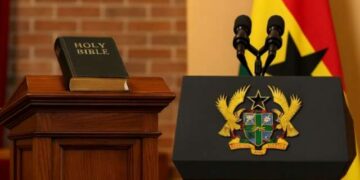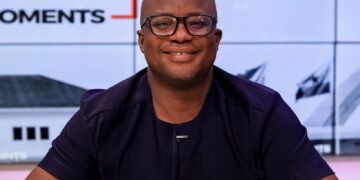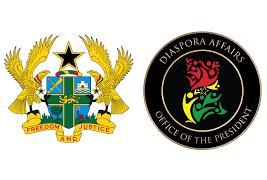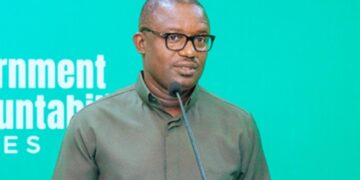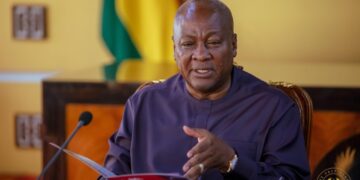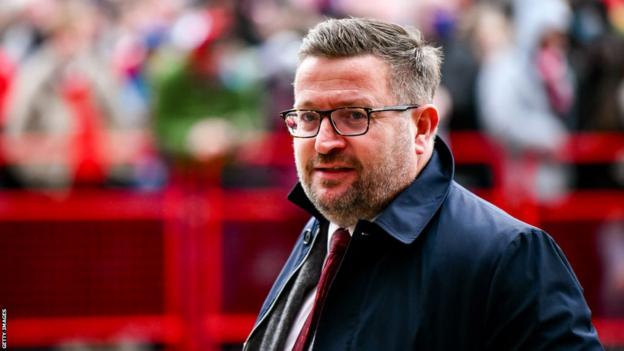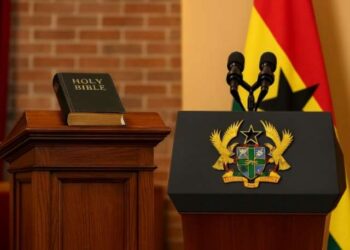Manchester United chief executive Richard Arnold is to leave the club after 16 years as Sir Jim Ratcliffe’s deal for a 25% stake in the Old Trafford side nears completion.
Arnold replaced Ed Woodward in February 2022 and will provide “transitional support” until the end of December.
His departure comes as Ratcliffe’s Ineos Group prepares to finalize its £1.25bn minority purchase of United.
No announcement on Ratcliffe’s deal is expected on Wednesday.
General counsel Patrick Stewart will take over as chief executive on an interim basis while the club decides on a permanent replacement.
Read Also: Hearts of Oak sack Coach Martinus Koopman after four months in charge
“It has been an incredible privilege to serve this great football club for the past 16 years,” said Arnold, 52.
“Through highs and lows, the constant has been the dedication of our employees and fans. I would like to thank all of them for their loyalty and commitment, and wish everyone associated with the club the very best for the future.”
Who is Patrick Stewart?
Stewart has represented United at recent Premier League and European Clubs’ Association meetings and managed the club’s legal and regulatory affairs in his role as general counsel.
He has been at the club since 2006 – but how long he will remain in his new interim position is unknown amid the imminent restructuring at Old Trafford.
ADVERTISEMENT
“Together with my leadership team colleagues, my job will be to ensure that the club’s foundations remain stable while we embrace changes that can make us stronger over the long term, on and off the pitch, and to support the search for a new permanent CEO,” Stewart said.
There will be a gap of six to eight weeks between the announcement of the Ratcliffe deal, which is expected to be ratified during November’s international break, and its confirmation by the Premier League, during which time the British billionaire will be unable to contribute to club operations.
United co-chairman Joel Glazer said: “I would like to thank Richard for his outstanding service to Manchester United over the past 16 years, and wish him all the best for his future endeavours.
“We are fortunate to be able to call on the deep knowledge and experience of Patrick Stewart to provide interim stability and continuity as we embark on a search for a new permanent CEO.”
What happened during Arnold’s reign as Man Utd chief?
Arnold first joined United in August 2007 and acted as the club’s managing director from 2013 until he replaced Woodward.
He recently oversaw United’s significant sponsorship agreements with Adidas and Qualcomm, but was criticised for his handling of the situation surrounding forward Mason Greenwood.
Arnold initially hinted to staff that the former England international was set to be reintegrated with the first-team after serious charges against him including attempted rape and assault were dropped, before deciding the player had to leave Old Trafford.
In June 2022 he met with some fans in his local pub to head off a planned protest outside his house following what he described as “a nightmare” season in which manager Ole Gunnar Solskjaer was sacked and United finished sixth.
Last summer Arnold oversaw the appointment of current manager Erik ten Hag, who delivered the club’s first trophy in six years by winning the Carabao Cup in his debut season.
However, United have endured a difficult start to the 2023-24 campaign, losing nine of their first 18 games in all competitions.
Fans have continued to protest against the Glazer family’s ownership of the club in recent years, including one occasion in May 2021 which caused United’s home league match against Liverpool to be postponed.
‘Arnold knew position would become virtually impossible’
Arnold stepped into Woodward’s shoes at Manchester United vowing to do things differently to his old university mate.
He didn’t want to personally sign players or do transfer deals. He was happy to delegate and concentrate on his strengths, which were driving commercial revenues.
To that end, he can look back on the £900m shirt manufacturing deal with Adidas and the £60m shirt sponsorship agreement with Qualcomm, both signed off in the summer just gone, with satisfaction.
Arnold took his role as a figurehead seriously and he wasn’t scared to stand back and let others take centre stage.
At Sir Bobby Charlton’s funeral, he greeted mourners at the entrance to Manchester Cathedral on behalf of the club but allowed his predecessor but one, David Gill, to read the eulogy because his relationship with the United legend was deeper.
Arnold signed off on the appointment of Ten Hag as Solskjaer’s successor as manager, backing the Dutchman over Cristiano Ronaldo’s exit, even though the previous regime revelled in the Portuguese’s return to Old Trafford.
He delivered on Ten Hag’s wish for a first-team meeting room on matchdays, even though it cost millions in lost sponsorship income as it took a lounge out of commission. He has also taken the decision to remove executive seats from the Stretford End next season, after expanding the current singing section.
All this has to be viewed as a positive. Yet Arnold was undermined by two significant factors, one that was not in his control, and one that very much was.
By accepting the chief executive role, Arnold knew he was becoming the Glazers’ man and would be criticised for decisions made by the owners. But it wasn’t his decision to launch the search for ‘strategic alternatives’ to the club’s current ownership structure, which has taken almost 12 months to complete.
Under Arnold’s watch, money has been allocated to facilities for the women’s and academy teams at Carrington, while significant improvements to Old Trafford remain at the planning stage.
And, while Arnold built stronger ties with official supporter groups – including the team wearing black armbands following the death of Manchester United Supporters Trust founding member Ian Stirling earlier this year – relations between the ownership and fans have worsened and evidently that is not going to change.
Arnold knew his own position would be rendered virtually impossible by that fact.
For all the positive work Arnold has done which means he will leave Old Trafford on good terms, the cloud of Greenwood also hangs over the club and is far from fully resolved.
It took six months, from when the case against Greenwood being dropped in February until the middle of August, for United to release the conclusions of their own investigation into the player.
Arnold was leading the club investigation and there is no hiding from the fact that as the summer dragged on, his view very much seemed to be that United should keep Greenwood.
But when that stance was privately articulated to employees – and then leaked – the overwhelmingly negative reaction led to a change of plan.
When United eventually made a public announcement, they confirmed Greenwood would continue his career “away from Old Trafford”. He is now on loan with La Liga outfit Getafe and is due to return to United at the end of the season.
By the time he is back, Arnold will have left and Ratcliffe should be making his presence felt.
Sources: BBC Sports

